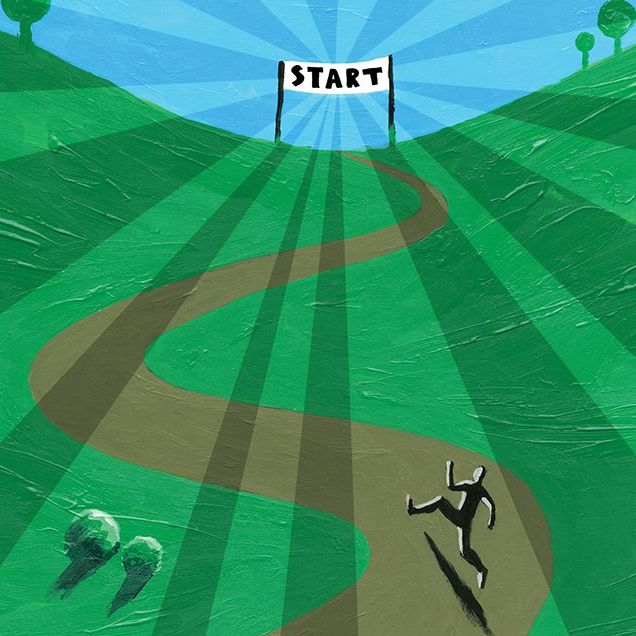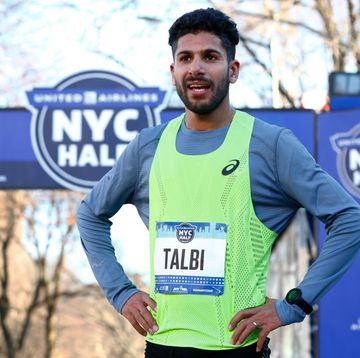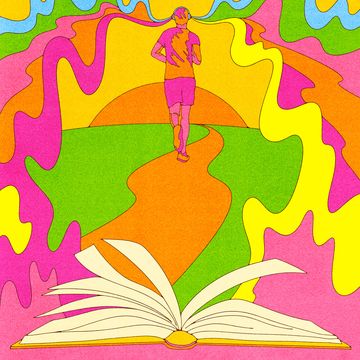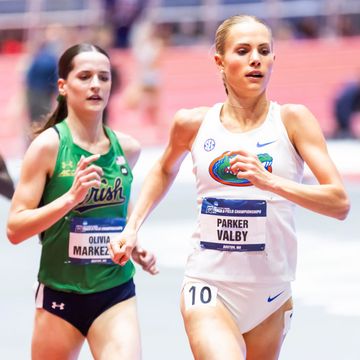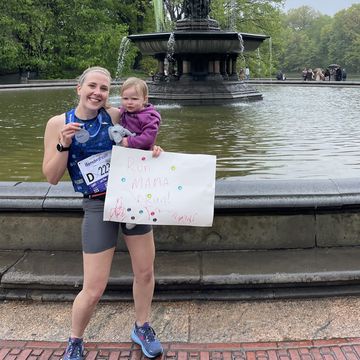It’s late fall and I’m talking to the grandmother of a cross-country runner I coached a few years back. I’m pleased to hear he’s still running and has signed up for a spring half marathon. She asks about the upcoming championship season for this year’s team and how each of the runners has been doing.
Then she asks, “When is your next race?”
I’m confused, as we were just discussing that, but I start to tell her again that it will be the conference championship next Thursday.
“No,” she says. “Not the team’s. When is your next race?”
I mumble something about not thinking about my running during the season, and she moves on. Her question, however, stays with me.
The fact is, I don’t have a race on my schedule. After a summer half marathon, I immersed myself in work and coaching and have failed to make any personal racing plans. A review of my training log, however, makes me realize that I need one. Before that half, I was putting in consistent 40- to 50-mile weeks. Since then, my weekly average is just shy of 30 and shows a startling inconsistency.
I’ve been running regularly for nearly 40 years. I love getting outdoors, feeling fit and fast, the mental clarity, the endorphins. Yet as much as I cherish running, it is still—every time I lace up—a decision. I know I’ll feel better a few minutes into the run. But, too often, given any obstacle in scheduling, conditions, or my energy level, I’ll opt out or settle for less. The runs get squeezed in only when they are convenient, becoming shorter and less intense. “Only entropy comes easy,” Chekhov wrote. The natural order is for things to fall apart. If that was true at 22, it is exponentially so at 52.
Over the years, I’ve found the best way to counteract the slide into lethargy is to schedule a race. I have always been a competitive runner. That said, I’m far from speedy enough to derive any economic value from racing or even much in the way of status. No one cares if I run a minute, or 10 minutes, faster or slower on any given day.
I recently interviewed Grant Robison, a former elite miler, who couldn’t understand why runners with no hope of being professional would train hard enough to hurt, or take racing so seriously as to leave a party early the night before. To truly fast people like him, a race is the end that justifies the suffering and sacrifice to get there. If you can’t achieve the results—in his case, making an Olympic team and securing a pro contract—training isn’t worthwhile. Which is why now, approaching 40, he hasn’t run at all for some time.
For me, racing is not the end but the means to get me to do the things I want to do. The race provides a reason to choose a path I want to take, but one that is hard to see clearly without a beacon at the end lighting the way.
Given my lifelong passion, I’ve often wondered why it can still be hard to get out the door without this prod. I found one explanation reading Harvard professor Daniel Lieberman’s book The Story of the Human Body. Lieberman explains this paradox as the result of a mismatch between what our bodies are suited for and the environment in which we find ourselves. Not long ago in human history, a run was not only always imminent but also necessary for survival. To be ready for the physical challenges our subconscious minds believe we may have to face at a moment’s notice, we’re programmed to conserve energy whenever we can.
“We humans…sometimes behave in ways that are not in our best interests…,” Lieberman writes. “Because we are poorly adapted to control deep cravings for comforts and calories that used to be rare.” Even though we now wallow in comforts and calories, we need a powerful reason to convince our primitive brain that an energy expenditure is worthwhile.
While it isn’t as compelling as a saber-toothed tiger breathing down my neck, a race gives me enough motivation to do more than the minimum. The threat of failure is real enough to sway my decision-making. With a goal looming, I start becoming the runner, and the person, I want to be.
I seldom get up before dawn without a deadline looming. But I rarely feel better than when I do, like for a 20-miler near my house in Nebraska that I described in an old journal:
I headed west at 4:15 a.m. with coyotes calling in the distance, my headlamp supplementing the light from the setting moon. Five miles in, horses appeared out of the gloom in the pasture on the right and ran alongside me for half a mile. At the turnaround, 10 miles from home, the sun had just peaked over the horizon to the east, painting the early morning sky orange and silhouetting the windmills on the sand hills. My legs warmed up and stride clicking, I flew home on the trail road—just in time for breakfast.
That run came a month before a 2004 marathon. As it turned out, race day was unseasonably hot, leading to a death-march finish. In hindsight, however, the outcome was irrelevant. With no race I would likely have slept in and done an easier, shorter run that day—and would have been lesser for it.
Training for a goal also makes me more strategic—engaging my mind as well as my body. Years ago, as an academic advisor at NYU, I asked a student what he thought of a course. “The teacher is okay, and the subject is interesting,” he said, “but there’s no final, and that takes all the energy out of the class.” The point of a class is learning, but without a measurement, it’s hard to hold onto attention.
A race is the final to my running. Without one, I can put in mindless daily runs and get by, not knowing or caring about details or results. Without consequences, my focus wanders.
Add a race and everything matters. I track my miles, pace, and heart rate. I dig deep and do speedwork, playing with reps and recoveries to work every system—and I actually go easy on easy days. I do supplemental strength and flexibility exercises. I turn down the second cookie. I pay attention to my form, cadence, and efficiency. I note what works and what doesn’t. My runs, indeed all of my life, become part of a grand experiment I never tire of.
I love running all the time, but both it and I are at our best when I’m training for a race, studying for a final.
* * *
Jonathan Beverly, the former editor-in-chief of Running Times, writes and runs on the high plains of the Nebraska/Colorado border.
